Needs and Gaps Study for Digital Psychosocial Wellness Services in Hong Kong
Background
Psychosocial wellness, which includes mental, emotional, social, and spiritual well-being, is an important component of health according to the World Health Organization (WHO). The WHO fact sheets updated in June 2022 reveal that mental health disorders affect approximately 1 in every 8 individuals globally. The demand for psychosocial wellness services is huge, which poses a heavy burden on healthcare systems worldwide. With the District Health Centre (DHC) infrastructure grounded in the Chief Executive’s 2022 Policy Address, promoting and enhancing psychosocial wellness has become a priority in Hong Kong to develop sustainable healthcare services. However, expanding and enhancing existing psychosocial services in Hong Kong to meet the needs of a growing population is a formidable challenge, requiring scalable, high-quality healthcare services that are not human resource-intensive. Recent advancements in information technology have made it possible to combine digital and data-driven approaches with traditional healthcare practices, resulting in synergistic effects that enable existing services to be scaled up even with limited resources.
Evidence suggests that only one-third of people with depression or anxiety seek professional help. Although they often prefer self-reliance and perceive negative attitudes toward seeking help, delays in treatment can lead to serious adverse outcomes and long-term disability. Therefore, digital psychosocial wellness services may be useful. Therefore, we aim to develop an evidence-based strategy for the success of primary healthcare advancement by enhancing the use of digital services. Understanding the service gaps and needs of the users is the basis for designing future psychosocial services. A survey research is being conducted to investigate the gaps and needs of different types of users. Our research questions include: 1) what kinds of information and services are needed?; 2) what are the gaps between information and services available and expected?; and 3) what is the level of awareness and intention to look for information or seek help?
We adopted an online survey. We applied the framework of the Kano model to assess the respondents’ satisfaction on specific features in a digital psychosocial wellness service and used the Health Care Climate Questionnaire to compare respondents’ perspective concerning their autonomy in traditional and digital psychosocial wellness services for the survey research. We target to survey around 1,200 respondents in Hong Kong. Some demographic information and their psychosocial health status will also be collected from the survey.
We started the fieldwork of the survey in November 2024 and expect it will be completed in the first quarter of 2025. As of 28 November 2024, there were 91 respondents. Although the survey is still ongoing, we present preliminary survey results for the following five questions in the questionnaire here:
- How aware are you of the available traditional psychosocial wellness services in Hong Kong? How did you learn about traditional psychosocial wellness services?
- How aware are you of the available digital psychosocial wellness services in Hong Kong? How did you learn about digital psychosocial wellness services?
- Have you ever faced any psychosocial issues in the past 12 months? What type of psychosocial issues have you faced?
- What types of digital psychosocial wellness services do you feel are needed in Hong Kong?
- Have you ever used any psychosocial wellness services in Hong Kong?
Traditional psychosocial wellness services typically involve in-person interactions between individuals seeking mental health support (e.g., counseling) and healthcare professionals (e.g., doctors, counselors). Digital psychosocial wellness services broadly refer to online platforms or applications that promote or support mental health. These five questions provide us some insights on the needs of the traditional and digital psychosocial wellness services in Hong Kong.
Survey Analysis Report
Demographic profile
The respondents came from diverse personal backgrounds. They were given the liberty to provide their demographic information. Out of the 91 respondents, 15 opted not to disclose their demographic details. Table 1 presents the demographic information of the 76 respondents.
Table 1. Demographic information of the respondents.
| Demographics | Group | Percentage |
|---|---|---|
| Gender | Male | 50% |
| Female | 50% | |
| Age | 18 – 24 | 23.7% |
| 25 – 35 | 38.2% | |
| 36 – 45 | 7.9% | |
| 46 – 55 | 18.4% | |
| 56 – 65 | 9.2% | |
| ≥65 | 2.6% | |
| Employment status | Full-time employed | 57.9% |
| Housewife/husband | 5.2% | |
| Retired | 9.2% | |
| Student | 25% | |
| Underemployed | 2.6% | |
| Place of Birth | Hong Kong | 88.2% |
| Outside Hong Kong | 11.8% | |
| Marital status | Married / Cohabiting | 40.7% |
| Single | 57.9% | |
| Spouse deceased | 1.3% | |
| Being a family caregiver | Yes | 21.1% |
| No | 78.9% |
Question 1. How aware are you of the available traditional psychosocial wellness services in Hong Kong? How did you learn about traditional psychosocial wellness services?
Figure 1 shows the distribution of the awareness of the available traditional psychosocial wellness services in Hong Kong. Around 60% (40.7%+18.7%=59.4%) of the respondents were not very aware or not aware at all about traditional psychosocial wellness services in Hong Kong. For those respondents who were somewhat aware of the traditional psychosocial wellness services in Hong Kong (74 out of 91 respondents), most of them heard these services through social media (56.8%) and school or university (52.7%) (Figure 2).
Figure 1. The awareness of the available traditional psychosocial wellness services in Hong Kong.
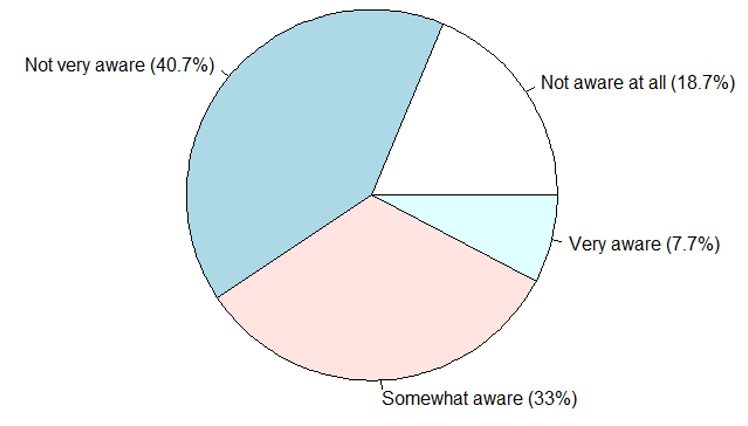
Figure 2. The ways learn about traditional psychosocial wellness services.
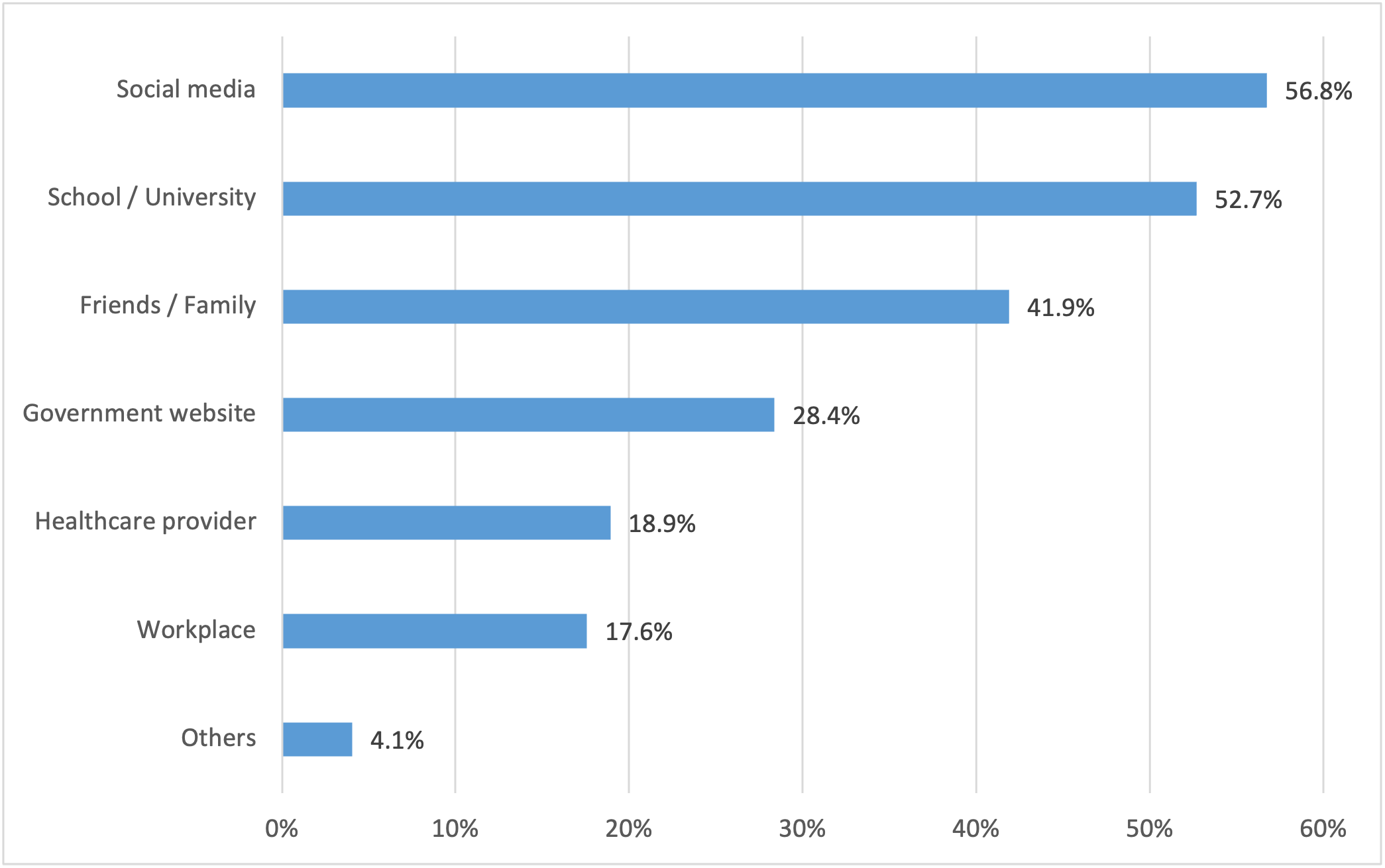
Question 2. How aware are you of the available digital psychosocial wellness services in Hong Kong? How did you learn about digital psychosocial wellness services?
Figure 3 shows the distribution of the awareness of the available digital psychosocial wellness services in Hong Kong. The results suggested that a larger proportion of the respondents (39.6%+38.5%=78.1%) were either not very aware or not aware at all about digital psychosocial wellness services in Hong Kong, compared to traditional psychosocial wellness services. For those respondents who were somewhat aware of the digital psychosocial wellness services in Hong Kong (56 out of 91 respondents), they knew these services through social media (62.5%) (Figure 4).
Figure 3. The awareness of the available digital psychosocial wellness services in Hong Kong.
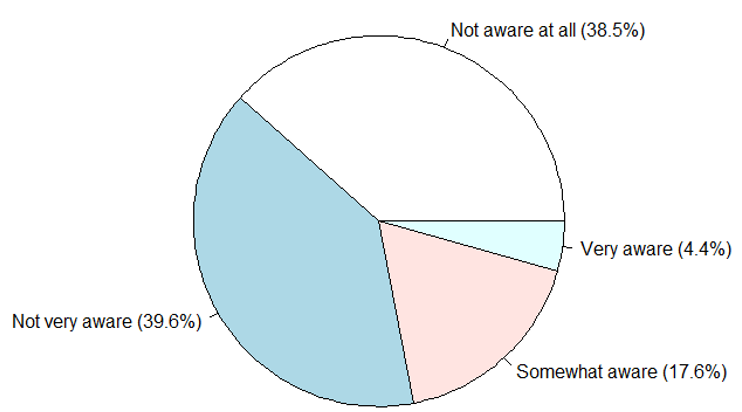
Figure 4. Ways to learn about digital psychosocial wellness services.
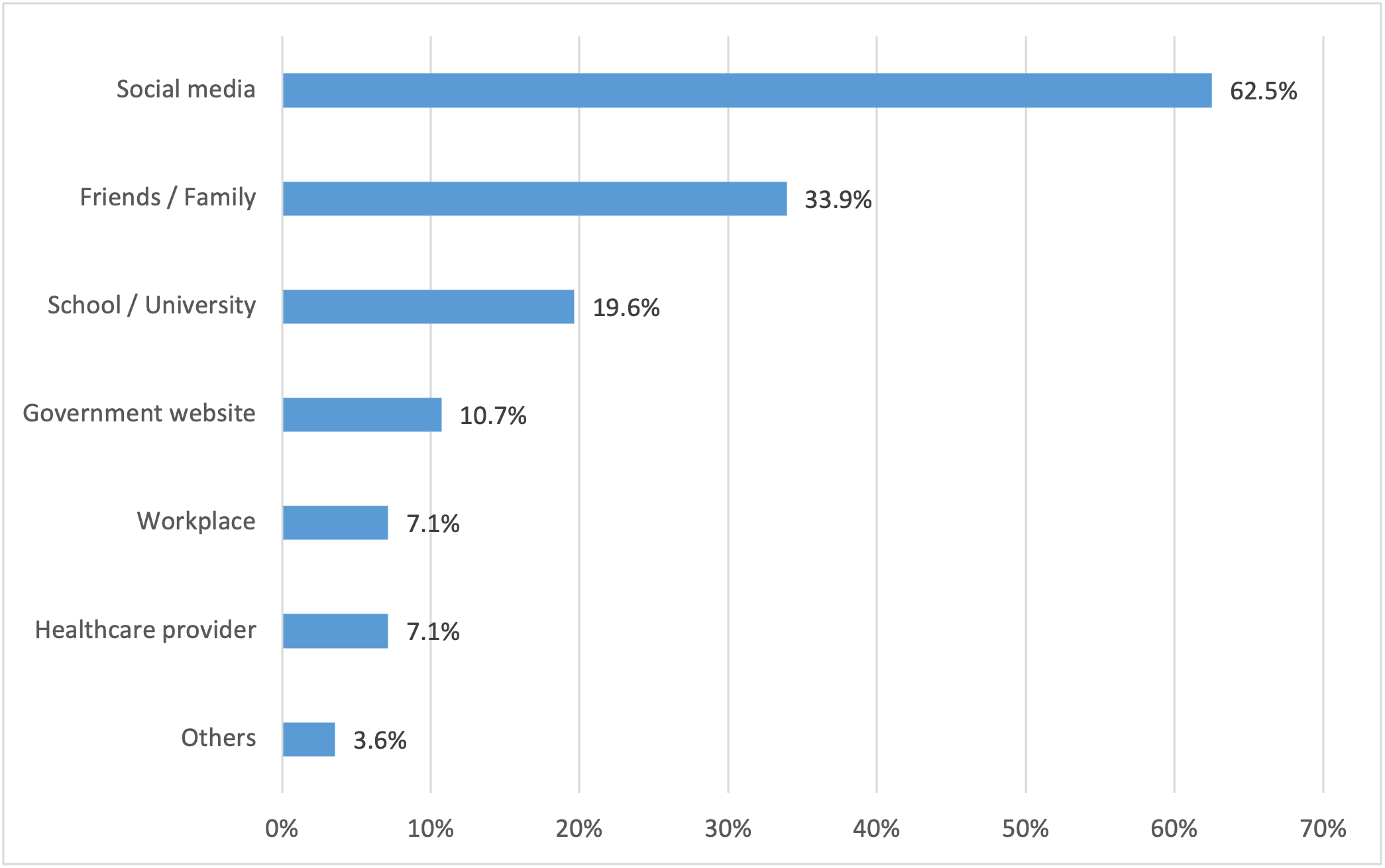
Question 3. Have you ever faced any psychosocial issues (e.g., anxiety, depression, social isolation, or relationship issues) in the past 12 months? What type of psychosocial issues have you faced?
Some 46 of the respondents (50.6%) expressed that they have faced at least one psychosocial issue in the past 12 months and the average number of psychosocial issues they faced was 2.6. Figure 5 displays the types of psychosocial issues the respondents have faced. Most of them have faced stress (84.8%) and anxiety (65.2%) in the past 12 months.
Figure 5. The types of psychosocial issues have faced in the past 12 months.

Question 4. What types of digital psychosocial wellness services do you feel are needed in Hong Kong?
When asking the types of digital psychosocial wellness services is needed in Hong Kong, more respondents suggested counselling (78%), stress management workshops (63.7%), and mental health education (60.4%).
Figure 6. The types of digital psychosocial wellness service the respondents feel are needed.
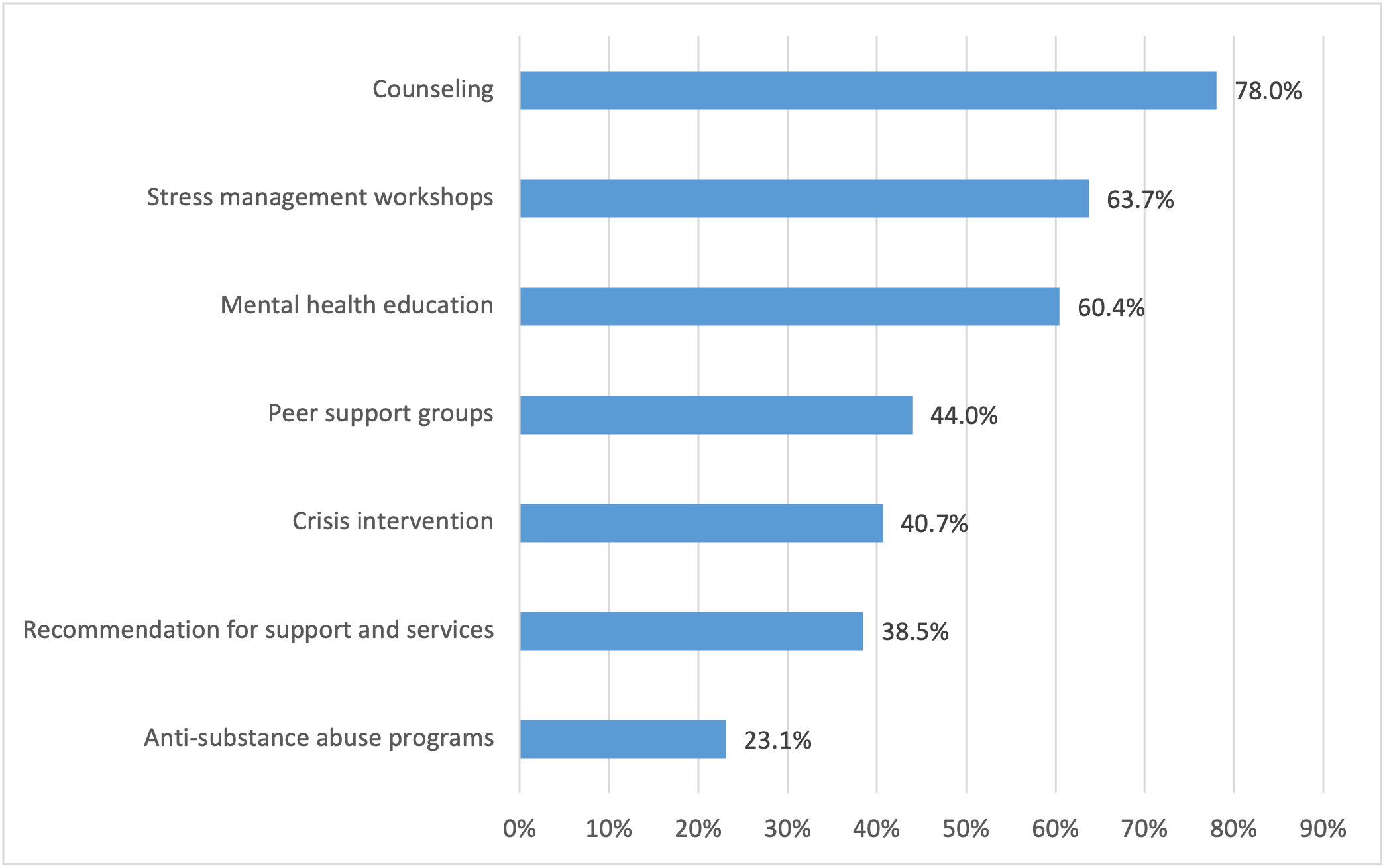
Question 5. Have you ever used any psychosocial wellness services in Hong Kong?
Figure 7 shows the percentages of respondents had even used any psychosocial wellness services in Hong Kong. It is found that 38.5% have used either traditional services, digital services, or a combination of both. The fact that individuals are seeking help is a positive sign that mental health awareness is increasing. But it also reflects the seriousness of the problem.
Figure 7. A pie chart showing the percentages of respondents regarding the question "Have you ever used any psychosocial wellness services in Hong Kong?".
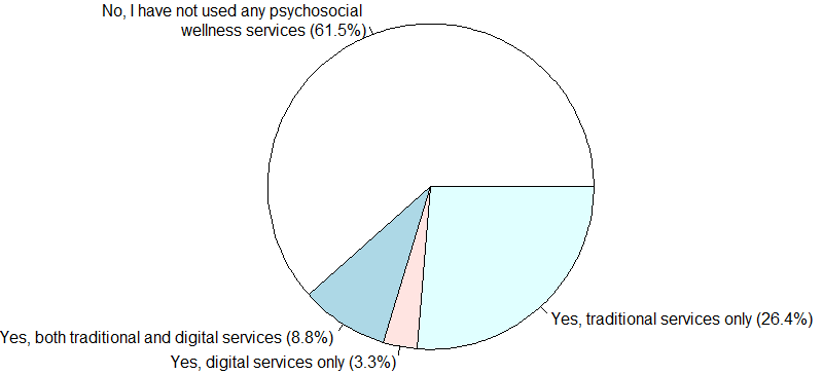
Conclusion
The preliminary results show that many respondents were not very aware or even not aware of the availability of both traditional and digital psychosocial wellness services. Furthermore, social media was the main source from which respondents could learn about psychosocial wellness services. About half of the respondents (50.6%) had faced at least one psychosocial issue in the past 12 months. Most of them reported that they had faced stress and anxiety. Regarding digital psychosocial wellness services, respondents feel that digital counselling, stress management workshops, and mental health education were the top three priorities. More than one-thirds (38.5%) of the respondents have ever used any psychosocial wellness services in Hong Kong.
The low awareness of both psychosocial wellness services suggests the need for targeted awareness campaigns to educate the public about the available services. Furthermore, the results also suggest that social media is a key information source for promoting these services. The survey also reveals that a substantial portion of the population faces mental health challenges, underscoring the importance of providing adequate support and resources to address these issues.